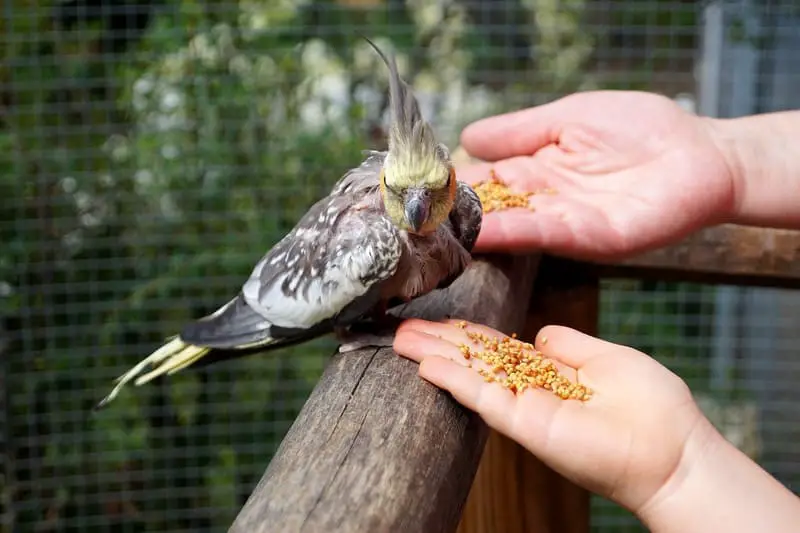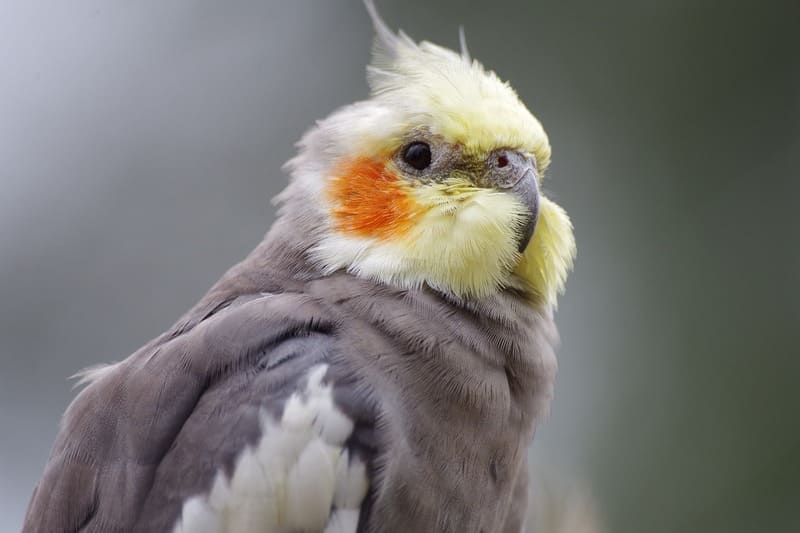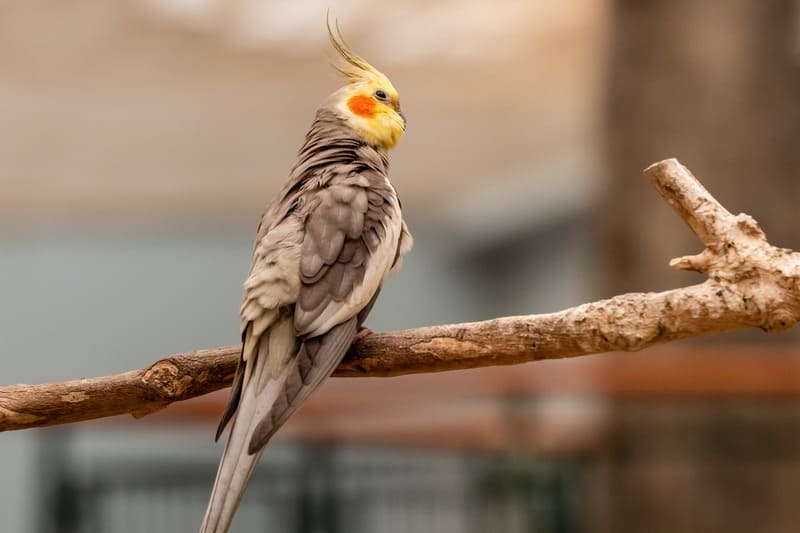Cockatiels are beloved for their charming personalities, vibrant plumage, and playful behavior. As a pet owner, it’s essential to be vigilant about your cockatiel’s health to ensure they lead a long, happy, and fulfilling life. Recognizing the signs of illness in your pet cockatiel is a crucial aspect of responsible ownership. In this comprehensive guide, we will explore common indicators of illness in cockatiels, potential health issues, and steps you can take to keep your feathered friend healthy and thriving.

The Importance of Monitoring Your Cockatiel’s Health
Cockatiels, like all living creatures, are susceptible to various health issues. These issues can range from minor ailments to more severe diseases. Being attuned to your cockatiel’s well-being and noticing early signs of illness is critical for prompt intervention and effective treatment. Here are some reasons why monitoring your cockatiel’s health is vital:
- Early Detection: Recognizing illness early allows for timely intervention, potentially preventing the condition from worsening.
- Treatment Options: Many avian health issues are treatable when addressed promptly. Early diagnosis can improve the effectiveness of treatment.
- Prevention of Spread: Some avian illnesses can be contagious. Identifying an ill bird and isolating them can prevent the spread of disease to other birds in your household.
- Improved Quality of Life: Prompt treatment and care can enhance your cockatiel’s quality of life, helping them recover more quickly and fully.
Common Signs of Illness in Cockatiels
Cockatiels are known for their playful and active nature, so any noticeable change in behavior or appearance may indicate that something is amiss. Pay close attention to the following common signs of illness:
1. Changes in Appetite
A sudden loss of appetite or a decrease in food consumption can be a clear sign that something is wrong. Watch for changes in your cockatiel’s eating habits, as this can be an early indicator of illness.
2. Weight Loss
Noticeable weight loss, particularly if it’s rapid or accompanied by changes in behavior, can be a significant concern. Regularly weighing your cockatiel can help you detect weight fluctuations.
3. Lethargy
If your cockatiel appears unusually lethargic, spending more time than usual perched in one place with ruffled feathers, this is a sign of potential illness.
4. Changes in Droppings
Keep an eye on your cockatiel’s droppings, as alterations in color, consistency, or frequency can be indicative of health issues. Healthy droppings should have a dark green fecal portion, a white urate portion, and clear urine.
5. Changes in Vocalization
Cockatiels are typically vocal and expressive birds. A significant reduction in vocalization or a change in the quality and tone of their calls may signal illness.
6. Respiratory Issues
Signs of respiratory distress include wheezing, labored breathing, sneezing, coughing, nasal discharge, or heavy, audible breathing. Respiratory problems can be serious and should be addressed promptly.
7. Discharge from Eyes or Nostrils
Discharge from the eyes or nostrils, especially if it’s excessive or discolored, may indicate an infection or illness.
8. Changes in Behavior
Unusual or aggressive behavior, reduced interest in playing, or increased aggression towards you or other birds can be an indication of stress or discomfort.
9. Swelling or Lumps
Any noticeable lumps or swelling on your cockatiel’s body should be examined by a veterinarian. These can be indicators of abscesses, tumors, or other health issues.
10. Feather Changes
Changes in feather quality or loss of feathers can be signs of health problems. Cockatiels may pluck their feathers if they are stressed, but medical issues can also cause feather problems.
11. Regurgitation
Cockatiels can regurgitate as a sign of affection, but excessive regurgitation can be a sign of illness. Watch for regurgitation that seems uncontrolled or happens frequently.
12. Sitting at the Bottom of the Cage
If your cockatiel is spending a lot of time at the bottom of the cage, it can be a sign of illness. This behavior is not normal and should be investigated.
13. Bleeding
If you notice bleeding from any part of your cockatiel’s body, it is a cause for concern. Be sure to address any injuries or bleeding immediately.

Common Health Issues in Cockatiels
Understanding the potential health issues that cockatiels can face will help you recognize and address problems effectively. Here are some common health concerns in pet cockatiels:
1. Respiratory Infections
Cockatiels can be susceptible to respiratory infections, which may result from exposure to drafts, poor ventilation, or infection from other birds. Symptoms can include sneezing, coughing, nasal discharge, and labored breathing.
2. Psittacosis (Parrot Fever)
Psittacosis is a bacterial infection that can affect cockatiels and other parrots. It can cause a range of symptoms, including lethargy, diarrhea, nasal discharge, and respiratory distress. Psittacosis is contagious to humans and should be treated promptly by a veterinarian.
3. Gastrointestinal Problems
Digestive issues, such as diarrhea, vomiting, or changes in droppings, can indicate gastrointestinal problems. These issues can result from dietary imbalances, infections, or other factors.
4. Feather Problems
Cockatiels may pluck their feathers due to stress, boredom, or medical issues. If feather plucking is a concern, a veterinarian can help identify the underlying cause.
5. Beak and Nail Overgrowth
Cockatiels’ beaks and nails continue to grow throughout their lives. If these are not naturally worn down through activity and play, they can become overgrown, leading to discomfort or problems with eating and perching.
6. Egg-Laying Difficulties
Female cockatiels may experience complications during egg-laying, including egg binding, where they are unable to lay an egg. This is a serious medical issue that requires immediate attention.
7. Polyomavirus
Polyomavirus is a contagious and potentially fatal disease that affects parrots, including cockatiels. Symptoms can include feather abnormalities, weight loss, and a swollen abdomen. There is no cure for Polyomavirus, so prevention and early detection are crucial.
8. Heavy Metal Poisoning
Cockatiels are known for their inquisitive nature and may chew on objects that contain toxic metals, such as lead or zinc. Ingesting these materials can lead to heavy metal poisoning, which can cause a range of symptoms, including vomiting and seizures.
9. Parasites
Cockatiels can be infested with internal parasites (worms) or external parasites (mites and lice). Signs of a parasitic infestation may include changes in droppings, itchiness, and feather loss.
10. Tumors
Like all creatures, cockatiels can develop tumors, which may appear as lumps or swellings on their bodies. While not all tumors are cancerous, any lump should be examined by a veterinarian.
What to Do If You Suspect Your Cockatiel Is Sick
If you notice any signs of illness or unusual behavior in your cockatiel, it’s essential to take action promptly. Here are steps to follow if you suspect your pet bird is sick:
- Isolate the Bird: If you have multiple birds, consider isolating the sick bird to prevent potential spread of illness to others. Place the ill bird in a warm, quiet, and comfortable location.
- Consult a Veterinarian: Reach out to an avian veterinarian with experience in treating birds. Avian veterinarians have specialized knowledge of bird health and can provide accurate diagnoses and treatment options.
- Provide Supportive Care: Follow any recommendations from the veterinarian for providing supportive care to your bird. This may include maintaining an appropriate temperature, offering supplemental heat, and providing extra attention and comfort.
- Administer Medications: If the veterinarian prescribes medications, follow the instructions carefully. Administer the medications as directed to ensure your cockatiel receives the appropriate treatment.
- Maintain Cleanliness: Ensure that your bird’s environment remains clean and sanitized to reduce the risk of infection. Clean food and water dishes regularly and clean the cage as needed.
- Offer Fresh Water: Make sure your cockatiel has access to fresh, clean water at all times.
- Monitor Food Intake: Monitor your bird’s food intake, and provide their favorite foods to encourage eating. Consult with your veterinarian for dietary recommendations if necessary.
- Minimize Stress: Minimize any sources of stress, loud noises, or excessive handling during the recovery period.
- Regular Follow-up: Follow up with your avian veterinarian as recommended to track your bird’s progress and make any necessary adjustments to their care plan.

Preventative Measures for Cockatiel Health
While it’s essential to be prepared for the possibility of illness in your cockatiel, taking preventative measures can significantly reduce the risk of health issues. Here are some steps to help maintain your cockatiel’s health:
- Regular Veterinary Check-ups: Schedule annual check-ups with an avian veterinarian to monitor your cockatiel’s health and catch any potential issues early.
- Nutritious Diet: Provide a balanced and nutritious diet, including a variety of fresh fruits, vegetables, and high-quality pellets. Avoid offering toxic or harmful foods.
- Clean Environment: Maintain a clean living environment for your cockatiel. Clean the cage regularly, including perches and toys.
- Socialization and Mental Stimulation: Offer socialization and mental stimulation through interaction, play, and toys. Mental stimulation helps keep your bird’s mind active and healthy.
- Quarantine New Birds: If you introduce a new bird to your household, quarantine them for at least 30 days before introducing them to your existing birds. This helps prevent the spread of potential diseases.
- Safe Toys and Perches: Ensure that toys and perches in your cockatiel’s cage are safe, free from hazards, and non-toxic.
- Limit Exposure to Harmful Substances: Keep your cockatiel away from tobacco smoke, chemicals, and other harmful substances that can affect their health.
- Provide Regular Exercise: Allow your cockatiel to exercise outside of their cage, either through supervised flight time or play in a safe, bird-proofed area.
- Maintain Appropriate Temperature: Cockatiels are sensitive to temperature changes. Ensure they are kept in a comfortable and stable environment, free from drafts and extreme temperatures.
- Regular Grooming: Maintain your cockatiel’s beak and nail health through regular grooming or consultations with an avian veterinarian.
Conclusion
Caring for a pet cockatiel involves attentiveness to their health and well-being. Being aware of the common signs of illness, understanding potential health issues, and taking proactive measures for prevention are vital aspects of responsible cockatiel ownership. Regular veterinary check-ups and a nurturing, enriched environment are key to maintaining your feathered friend’s health and ensuring they lead a fulfilling and happy life. Remember that your avian veterinarian is your best resource for addressing health concerns and providing guidance on maintaining your cockatiel’s well-being.
